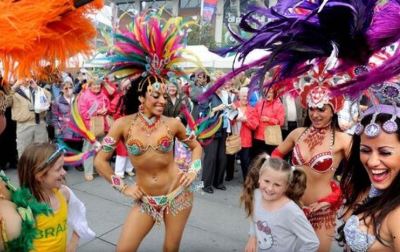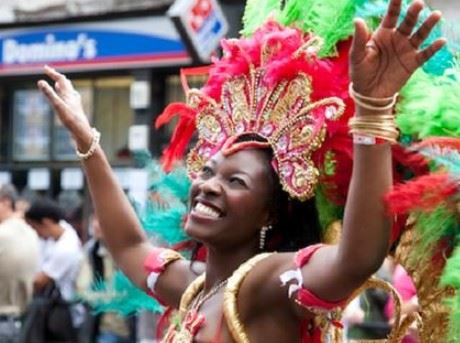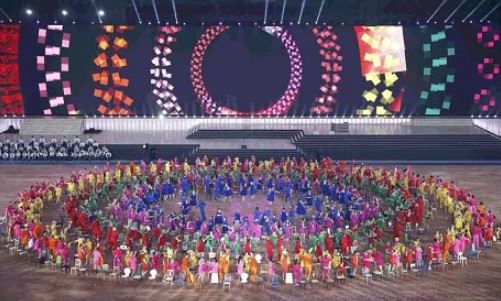The UK bid for the 2012 Olympic and Paralympic games promised that London’s 2012 programme would champion culture and education alongside sport, with a Cultural Olympiad to inspire young people and celebrate the country’s diversity across the UK. The Cultural Olympiad was launched in 2008 as a four-year, UK-wide programme, developed by and for communities, especially young people, with special programmes to celebrate Deaf and disabled artists, the UK’s diverse creative industries, heritage and natural environments, as well as icons including William Shakespeare.

The finale of the Cultural Olympiad was the London 2012 Festival, a curated UK-wide festival showcasing the best of the Cultural Olympiad with works from leading British and international artists.
Diversity
The UK already had a good reputation for cultural programming before the Cultural Olympiad and Festival, so raising the bar was a challenge. The difference was seen mostly in the scale and diversity of the programme, the championing of ‘new’ work with an emphasis on values, themes and the development of new partnerships within and across sectors.
The 2012 programme had a broad range of activities across a wide geographical area with artists of diverse types and nationalities. Of the almost 118,000 activities over the Olympiad, 29 per cent (33,631) took place in the 12-week London 2012 Festival period.

The programme’s commitment to engagement and active participation resulted in 52 per cent of all activities including sessions for education, training or taking part. Some regions matched London for the number of sessions of education they held. Whilst there are a lot of art forms, many involved outdoor activities, bringing art into unusual places.
The London 2012 Festival projects were generally classic artforms, with projects often involving high profile artists in theatre, led by the World Shakespeare Festival, the visual arts, music and dance. Dance was also dominant, with a flagship mass participation project, Big Dance. All the competing Olympic nations were represented at the BT River of Music, being free concerts across London and a week of poetry translation at the Southbank Centre in Poetry Parnassus. The Festival also celebrated film and comedy with new commissions, new productions and premiers as well as new partnerships and new ways of working, many of which would not have happened without the Cultural Olympia or would have taken on a different form. The festival also offered free participation opportunities for local communities with a programme on a geographical scale unmatched by any previous UK cultural event.

In contrast, the general Cultural Olympiad was dominated by combined arts and had many more museum and heritage projects and community-led events including sport, health and education. In total the Cultural Olympiad created 5,370 new artistic works or commissions, ranging from films, fanfares and carnival floats to costumes, plays, graphic murals and more.
Legacy
An additional promise was a legacy for those who participated, with many of the new partnerships, festivals and commissions continuing beyond 2012, to include the Glasgow 2014 Commonwealth Games and the Rio 2016 Olympic and Paralympic Games which both premiered at the London 2012 Festival.
The scale and the ambition of some of the projects enabled them to flourish beyond 2012, particularly festivals, employment and training programmes and touring productions, but also projects covering the full breadth of the Cultural Olympiad.
For the UK cultural sector, the evidence after the close of the festival was that people were motivated to continue extending their engagement in culture as a result of their London 2012 experiences. This motivation was higher for people that took part in the Cultural Olympiad and the London 2012 Festival.
The Cultural Olympiad and post-Olympiad activity also raised the profile of the UK’s culture, opening up iconic locations across the country, to reach new tourist markets with more than half the projects planning to continue after the event.
Commissions
The London 2012 Festival promised ‘once-in-a-lifetime’ commissions, with a commitment to serving communities throughout the UK in partnership with local, national and international partners.
Using the Olympic and Paralympic Movements’ values and themes for inspiration resulted in many commissions. The most famous included a commission to Richard Long to present work alongside the Olympic cycling race in Box Hill Road River. Also used in a commission was Arthur’s Seat in Edinburgh, used as the grounds for a live piece of public art created using 120 endurance runners in Speed of Light. The Cultural Olympiad also saw the production of new films responding to the Games, such as BAFTA winner The Swimmer by Lynne Ramsay and Deborah Warner and Fiona Shaw’s Olympic Truce inspired Peace Camp. The collaboration of the Mayor of London with large scale pop-up commissioned celebrations of London included Piccadilly Circus Circus and Elizabeth Streb’s One Extraordinary Day and the world premiere of Mittwoch aus Licht by Birmingham Opera Company.



